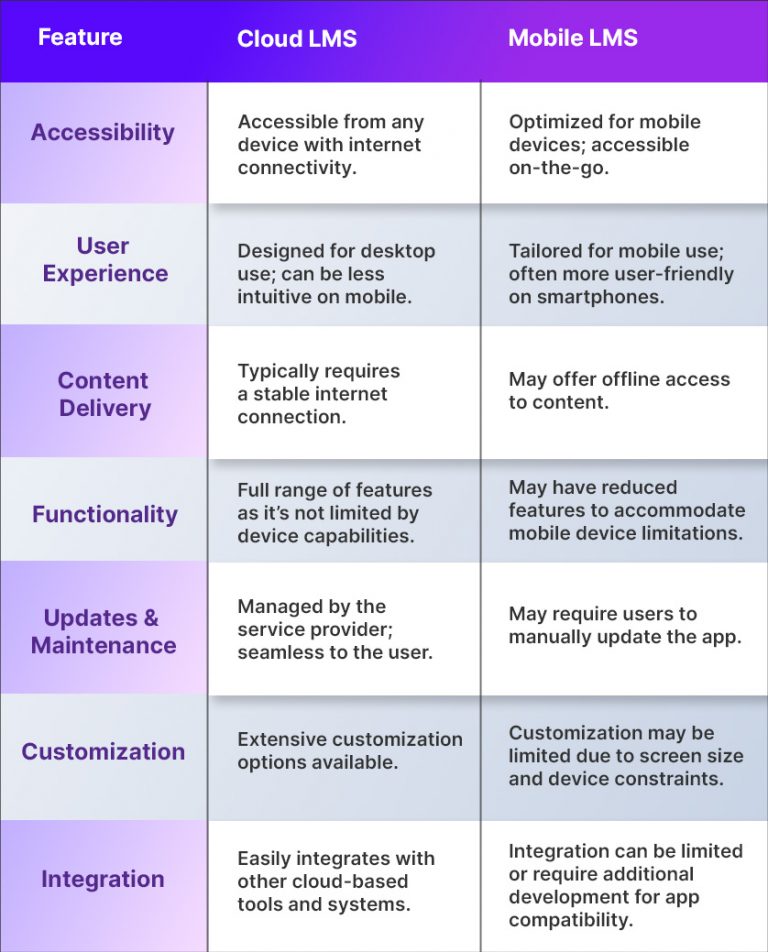Introduction
The digital transformation in education is rapidly advancing, with Learning Management Systems (LMS) at the forefront. As we explore the future of digital learning, we’ll delve into how LMS software is revolutionizing eLearning platforms, enhancing course management, and providing comprehensive LMS solutions for educators and students alike.
Cloud LMS and Mobile LMS: The Future of Learning Management Systems
Benefits of Cloud-Based LMS
Cloud-based LMS offers numerous advantages, including scalability, cost-effectiveness, and ease of access. Institutions can save on infrastructure costs and provide students and educators with the flexibility to access learning materials from anywhere, at any time. This accessibility ensures that learning is not confined to the classroom, promoting continuous education.
The Rise of Mobile LMS
With the increasing use of smartphones and tablets, mobile LMS is becoming a crucial component of digital learning. Mobile LMS allows students to engage with course content on-the-go, making learning more convenient and adaptable to their schedules. This flexibility is particularly beneficial for adult learners and professionals who need to balance education with other responsibilities.
Accessibility and Flexibility in Learning
The combination of cloud and mobile LMS ensures that education is accessible to a broader audience. Students with disabilities can benefit from features such as screen readers and voice recognition, while those in remote areas can access quality education without the need for physical attendance. This inclusivity is a significant step towards democratizing education.

The Role of LMS Software in Modern Education
Enhancing eLearning Platforms
LMS software enhances eLearning platforms by providing a centralized system for managing course content, assessments, and student progress. Educators can create interactive and engaging learning experiences through multimedia content, quizzes, and discussion forums. This interactivity fosters a more engaging and effective learning environment.
Streamlining Course Management Systems
LMS streamlines course management by automating administrative tasks such as enrollment, grading, and reporting. This automation reduces the workload for educators, allowing them to focus more on teaching and student support. Additionally, it ensures that students receive timely feedback and can track their progress throughout the course.
LMS Tools for Educators and Students
LMS provides a range of tools for both educators and students. Educators can use analytics to monitor student performance and identify areas where additional support is needed. Students can benefit from personalized learning paths, which adapt to their individual needs and pace. These tools enhance the overall learning experience and improve outcomes.
Integration and Customization of LMS
LMS Integration with Existing Systems
Integrating LMS with existing systems such as Student Information Systems (SIS) and library databases ensures a seamless flow of information. This integration allows for better data management and reduces redundancy. For example, student grades and attendance records can be automatically updated in the SIS, saving time and reducing errors.
Custom LMS Solutions for Institutions
Custom LMS solutions allow institutions to tailor the system to their specific needs. This customization can include branding, unique course structures, and specialized features. By aligning the LMS with the institution’s goals and requirements, educators can create a more cohesive and effective learning environment.
Adapting LMS Features to Meet Educational Needs
LMS features can be adapted to meet the diverse needs of educational institutions. For example, gamification elements can be added to make learning more engaging, while advanced analytics can provide insights into student behavior and performance. These adaptations ensure that the LMS remains relevant and effective in a rapidly changing educational landscape.
Innovations in LMS and eLearning Platforms
Emerging LMS Tools and Technologies
Emerging technologies such as virtual reality (VR) and augmented reality (AR) are being integrated into LMS to create immersive learning experiences. These technologies can simulate real-world scenarios, allowing students to practice skills in a safe and controlled environment. Additionally, AI-powered chatbots can provide instant support and feedback to students, enhancing their learning experience.
The Impact of AI on LMS
Artificial Intelligence (AI) is transforming LMS by enabling personalized learning experiences. AI algorithms can analyze student data to identify learning patterns and recommend tailored content. This personalization ensures that students receive the support they need to succeed, improving retention and outcomes.
Future Trends in LMS and Digital Learning
The future of LMS and digital learning is likely to be shaped by advancements in AI, VR, and data analytics. These technologies will enable more personalized and immersive learning experiences, making education more engaging and effective. Additionally, the increasing focus on lifelong learning will drive the development of LMS that cater to learners of all ages and stages of their careers.
Choosing the Right LMS for Your Institution
Evaluating LMS Features and Capabilities
When choosing an LMS, it is essential to evaluate its features and capabilities. Institutions should consider factors such as ease of use, scalability, and integration with existing systems. Additionally, the LMS should offer robust analytics and reporting tools to monitor student progress and outcomes.
Key Considerations for LMS Selection
Key considerations for LMS selection include cost, support, and customization options. Institutions should choose an LMS that fits within their budget and offers reliable customer support. Customization options are also crucial, as they allow the LMS to be tailored to the institution’s specific needs and goals.
Top LMS Solutions in the Market
There are several top LMS solutions in the market, each with its unique features and strengths. Some of the leading LMS platforms include Moodle, Blackboard, and Canvas. Institutions should carefully evaluate these options to determine which one best meets their needs and requirements.
Conclusion
The future of digital learning with Learning Management Systems in education is promising. As technology continues to evolve, LMS will play a crucial role in enhancing eLearning platforms, streamlining course management, and providing personalized learning experiences. By choosing the right LMS and leveraging its features, educational institutions can create a more engaging and effective learning environment for their students.
